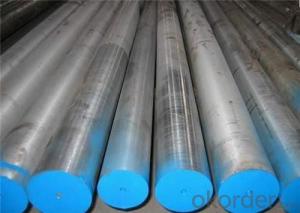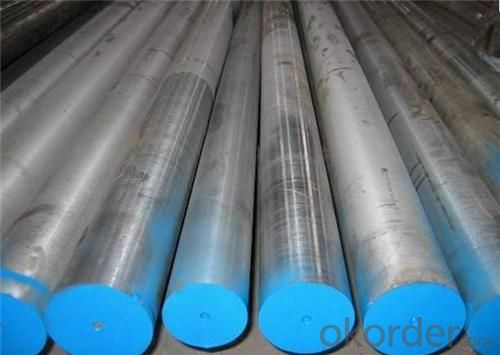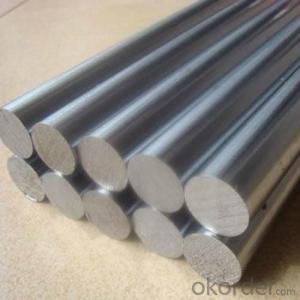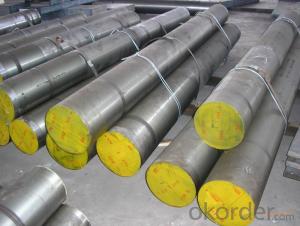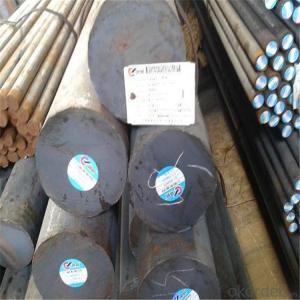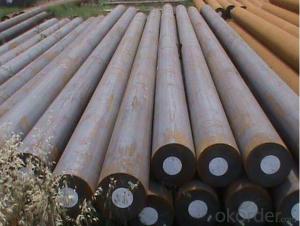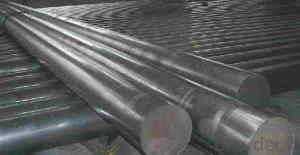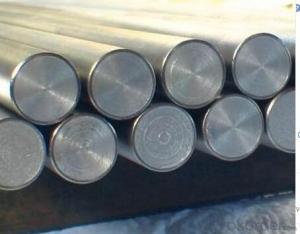High Quality Round Bar Bearing Steel Gcr15/SAE 52100
- Loading Port:
- China main port
- Payment Terms:
- TT OR LC
- Min Order Qty:
- 500 m.t.
- Supply Capability:
- 10000 m.t./month
OKorder Service Pledge
OKorder Financial Service
You Might Also Like
Specifications:
1) Grade: Bearing steel SAE 52100 / GCr15 round bars
2) Diameter: 20-500mm
3) Hot rolled/forged, annealed
Application:
Bearing steels are the most important special steels for the manufacturing of rolling elements and bearing rings.
The high-carbon chrome bearing steels are widely used in transmission shaft rollers and sleeves for auto,construction machinery, inter combustion engine manufacturing,electrical locomotive,machine tool,tractor,steel rolling equipment,drilling machinery and others.
Carburized bearing steels are mainly used in railway locomotives and wind power field.The self-developed high-grade bearing steels are acknowledged by lots of famous bearing companies in the world.
Packaging & Delivery
Mark: Heat No. will be cold stamped and Steel grade, diameter (mm), length (mm), and the manufacturer LOGO and weight (kg) is painted.
Standard seaworthy packing or as customer required
Delivery time: Within 30 days after order is confirmed.
- Q: What are the different forging methods used for special steel?
- Special steel can be forged using several different methods, including open die forging, closed die forging, and ring rolling. Open die forging, also known as smith forging, involves heating the metal and shaping it between flat dies or anvils. The metal is hammered and rotated repeatedly until it reaches the desired shape. This method is ideal for producing customized large and complex shapes. Closed die forging, also known as impression die forging, requires placing the heated metal between multiple dies that have impressions of the final shape. The metal is compressed to fill the impressions and take on the shape of the dies. This method is suitable for producing accurately sized small to medium components. Ring rolling is a specific forging method used to create seamless rings. The metal is heated and positioned between two rollers, which apply pressure to shape the metal into a ring. This technique is commonly used for producing rings with thin walls and large diameters. Secondary forging processes can be employed to further enhance the properties of special steel. Heat treatment, such as annealing or quenching, can improve the material's strength and hardness. Additionally, machining operations can be performed to achieve the desired dimensions and surface finish. The choice of forging method for special steel depends on factors such as the desired shape, size, and properties of the final product. Each method has its own advantages and limitations, and manufacturers select the most appropriate technique based on the specific requirements of the application.
- Q: How does special steel contribute to improving product performance under extreme conditions?
- Special steel contributes to improving product performance under extreme conditions by offering enhanced strength, corrosion resistance, and high temperature stability. Its unique composition and manufacturing processes allow it to withstand extreme temperatures, pressures, and harsh environments, ensuring the reliability and durability of products in challenging circumstances. Additionally, special steel's superior mechanical properties and ability to maintain structural integrity enable it to resist wear, fatigue, and deformation, thus improving the overall performance and longevity of products when exposed to extreme conditions.
- Q: How does special steel contribute to the renewable energy sector?
- Special steel plays a crucial role in the renewable energy sector by enabling the development and production of efficient and durable components for renewable energy technologies. For example, special steel is used in the manufacturing of wind turbine towers, blades, and foundations, ensuring their structural integrity and longevity. It is also utilized in solar panel frames, supporting structures, and transmission systems, enhancing their resilience and performance. Additionally, special steel is essential in the construction of hydroelectric power plants, ensuring the strength and reliability of penstocks, turbines, and other critical components. Its unique properties and characteristics contribute significantly to the overall efficiency, sustainability, and cost-effectiveness of renewable energy systems.
- Q: How does special steel contribute to the transportation equipment industry?
- Special steel plays a crucial role in the transportation equipment industry by providing high strength, durability, and resistance to wear and corrosion. It allows for the construction of lighter yet stronger components, leading to improved fuel efficiency, increased payload capacity, and enhanced safety in vehicles. Additionally, special steel enables the production of precision parts and components, ensuring the reliability and performance of transportation equipment.
- Q: How does special steel perform in high-speed applications?
- Special steel is designed with the specific purpose of achieving exceptional performance in high-speed applications. Its composition and manufacturing process are unique, resulting in high resistance to heat, wear, and fatigue. This enables it to withstand the extreme conditions frequently encountered in high-speed operations. One key characteristic of special steel that makes it perfect for high-speed applications is its impressive strength-to-weight ratio. This means it can maintain its structural integrity and bear heavy loads while remaining lightweight. Thus, it efficiently handles the demands of high-speed operations. Moreover, special steel exhibits excellent heat resistance, a crucial attribute in high-speed applications where temperatures can drastically rise. It possesses a high melting point and retains its strength and hardness even at elevated temperatures. Consequently, it avoids deformations or failures that may occur with other materials. Furthermore, special steel's outstanding wear resistance guarantees long-lasting performance in high-speed applications. It can endure continuous friction and abrasive forces at high speeds, reducing the need for frequent replacements and improving overall efficiency. Additionally, special steel's resistance to fatigue is another pivotal factor in its performance in high-speed applications. It can withstand repetitive loading and cyclic stresses without developing cracks or fractures. This ensures a longer service life and minimizes the risk of sudden failures. In conclusion, special steel is engineered with precision to excel in high-speed applications. Its high strength-to-weight ratio, heat resistance, wear resistance, and fatigue resistance make it an ideal choice for industries such as aerospace, automotive, and manufacturing, where high-speed operations are common. Its superior performance in these applications guarantees reliable and efficient results, ultimately contributing to enhanced productivity and safety.
- Q: What are the requirements for special steel used in transportation infrastructure?
- Special steel used in transportation infrastructure must meet certain requirements to ensure its durability, strength, and resistance to various environmental factors. Some of the key requirements for special steel in transportation infrastructure include: 1. High Strength: Special steel used in transportation infrastructure must have high tensile strength to withstand heavy loads and stresses. It should be able to resist deformation and maintain its structural integrity under significant pressure. 2. Corrosion Resistance: Transportation infrastructure is often exposed to harsh weather conditions, including rain, humidity, and saltwater. Special steel must have excellent corrosion resistance to prevent rusting and deterioration over time. This is particularly important for bridges, tunnels, and railway tracks located near coastal areas. 3. Fatigue Resistance: Transportation infrastructure experiences repetitive and cyclic loading, which can lead to fatigue failure if the steel used is not resistant to this type of stress. Special steel should have good fatigue resistance properties to prevent cracking and failure due to repeated loading. 4. Weldability: Special steel used in transportation infrastructure should have good weldability to facilitate construction and repairs. It should be easily weldable without compromising its strength and performance. 5. Impact Resistance: Transportation infrastructure, such as guardrails and crash barriers, is subjected to impact loads from vehicles. Special steel should possess excellent impact resistance to absorb and distribute the energy from impacts, reducing the risk of catastrophic failure. 6. Fire Resistance: In the event of a fire, special steel used in transportation infrastructure should have a high melting point and retain its structural integrity for a reasonable amount of time. This is crucial for ensuring the safety of passengers and minimizing the damage caused by fire incidents. 7. Low Maintenance: For cost-effectiveness and long-term sustainability, special steel used in transportation infrastructure should require minimal maintenance. It should have a long service life and minimal need for repainting, repair, or replacement. Meeting these requirements ensures that the special steel used in transportation infrastructure can provide a safe, reliable, and durable foundation for roads, bridges, railway tracks, and other critical components of the transportation network.
- Q: How does tool steel maintain its hardness at high temperatures?
- Tool steel maintains its hardness at high temperatures due to its high carbon content and alloying elements. The high carbon content allows for the formation of carbides, which are extremely hard and stable even at elevated temperatures. Additionally, the alloying elements in tool steel, such as chromium, tungsten, and molybdenum, form secondary carbides that further enhance the steel's hardness and heat resistance. These carbides act as strengthening agents, preventing the steel from losing its hardness and maintaining its performance even under high-temperature conditions.
- Q: Can special steel be used in the food processing industry?
- Yes, special steel can be used in the food processing industry. Special steel alloys, such as stainless steel, are commonly used in food processing equipment and machinery due to their corrosion resistance, durability, and hygiene properties. These steel alloys provide a reliable and safe material for handling and processing food, making them an ideal choice for the industry.
- Q: How is special steel protected against corrosion?
- Special steel is protected against corrosion through a variety of methods, including the application of protective coatings such as zinc or epoxy, the use of corrosion-resistant alloys in the steel composition, and the implementation of cathodic protection systems that involve the use of sacrificial anodes or impressed current to prevent rusting.
- Q: How does special steel perform in terms of thermal expansion?
- Special steel typically has a low coefficient of thermal expansion, meaning it expands and contracts less with changes in temperature compared to other types of steel. This property makes it highly suitable for applications where thermal stability is crucial, such as in the aerospace and automotive industries.
Send your message to us
High Quality Round Bar Bearing Steel Gcr15/SAE 52100
- Loading Port:
- China main port
- Payment Terms:
- TT OR LC
- Min Order Qty:
- 500 m.t.
- Supply Capability:
- 10000 m.t./month
OKorder Service Pledge
OKorder Financial Service
Similar products
Hot products
Hot Searches
Related keywords
